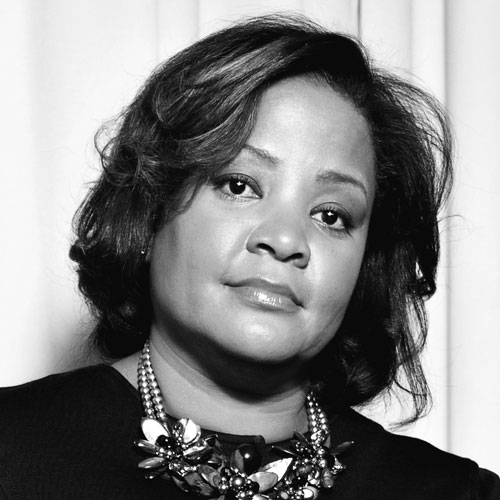Lucy Fato might never have become a lawyer. As a student in the University of Pittsburgh’s joint MBA/JD program, she could have easily taken the other fork in the road. However, just before starting the program, she spent a day shadowing a public defender, going to court, observing clients, and discovering how satisfying it could be to defend people’s rights. After the first year of the program, which concentrated on the legal curriculum, she withdrew from business courses and focused exclusively on law.
Early in her tenure at Davis Polk & Wardwell, Fato worked on a few initial public offerings and got hooked on corporate law. “I liked interacting with teams of people and the fact that corporate work seemed to move faster than litigation. It can also be less adversarial, and lead to win-wins for both sides,” she explains.
In 2005, after fourteen years at Davis Polk, including five as a capital markets partner, she was approached about a position at Marsh & McLennan Companies, the Fortune 500 professional services firm, working for general counsel Peter Beshar. Marsh & McLennan had just agreed to an $850 million settlement of civil charges brought by then-New York Attorney General Eliot Spitzer. After a few discussions about Beshar’s vision for the legal department and what kind of role Fato could play, she accepted the position of deputy general counsel and corporate secretary.
“Taking that job was one of the best decisions I ever made,” Fato says. “I’m grateful I was able to move into a significant number-two role in my first endeavor in-house. At that time, it was rare for someone other than the GC to be corporate secretary, but access to the board of directors and senior management team was what made the job most appealing. I also took a leading role in overhauling the company’s corporate governance structure and disclosure procedures, as well as centralizing the global legal department. I was as close to being a GC as possible without having the title.”

In August 2014, after almost nine years at Marsh & McLennan, she got her chance to try her hand at the top rung and moved to McGraw Hill Financial, making her part of a very elite group—just 21 percent of Fortune 500’s general counsel are women.
As at Marsh & McLennan, one of her first tasks is to reorganize the legal department to be more centralized. “I’ve been spending my first few months figuring out who everyone is, what they do, and how the legal department interacts with the business units,” Fato says.
In its early days, McGraw Hill was a collection of diversified businesses with many lawyers embedded in the various divisions. The corporate legal department was made up mostly of generalists overseeing areas like employment law, litigation, mergers and acquisitions, and public company disclosure. Even after selling off the publishing and education businesses and focusing more on the capital markets arena, the largely decentralized legal structure remained. “Something was missing,” Fato says. “The lawyers were still operating in a siloed fashion. There wasn’t sufficient communication or knowledge sharing across business units.”
Read more of Profile’s Top 50 articles.
She has already launched several initiatives to change that. “I held a town hall call my second day, with people dialing in from all over the world,” she says. “It was attended by about 75 percent of the department, because I was only able to identify that many people in my first twenty-four hours. At the end of the call, I invited everyone to e-mail me and tell me about their role at the company, their background, ask any questions they wanted and, most importantly, offer any advice they might have as I took on my new role. I was inundated. Word spread, and I soon heard from others in the department who had been left off my initial list. Everyone was eager to be part of a truly global department, and many people just wanted to thank me for asking about them and what they do.” She has now created a global e-mail list of everyone in the department, which had not existed before.
The flood of e-mails led Fato to set up what she called a “listening tour”—a series of calls for about fifteen people at a time. The attendee list is determined randomly across divisions and geographies. There is no set agenda. “It’s been great, even if the only outcome of a call is to introduce people to each other. Some people in the department have worked here for over a decade without ever meeting the lawyers outside their business unit.”
In addition to building relationships with each other, Fato is calling on the lawyers to get to know their regulators. “Engagement with regulators is one of my top priorities,” she says. “In regulated businesses, lawyers are critical to gaining trust and credibility. We need to understand what our regulators care about and vice versa.”
Fato joined McGraw Hill Financial soon after it became a defendant in a major civil lawsuit. This time, it was the Department of Justice’s
$5 billion claim that Standard & Poor’s had inflated ratings and was slow to downgrade debt linked to mortgage-backed securities preceding the 2008 financial crisis. Helping the company find a path forward is another top priority. “I’m looking forward to the future,” she says. “We have an amazing collection of businesses. I know the value in-house lawyers can add to an enterprise, and I want this department to help McGraw Hill Financial achieve its strategic goals, whether through organic growth, mergers and acquisitions, or international expansion. All the while, we need to be more proactive and help manage risk intelligently.”
Fato admits she can be overly eager, wanting to accomplish everything at once. “I have to keep reminding myself that big changes don’t happen overnight,” she says. “I have to pace myself and prioritize. We live in a very dynamic, evolving world, and we have to continue to adjust as situations change. My vision is to create a world-class global, legal, and regulatory affairs department that understands our businesses as well as the regulatory landscape we face. To do that, I intend to surround myself with the right people with the right skill-sets, many of whom are already here, and let them do their job.”


